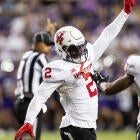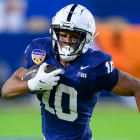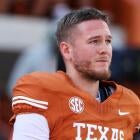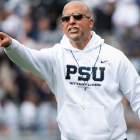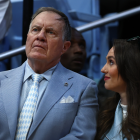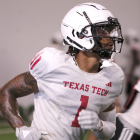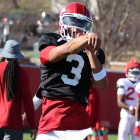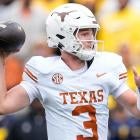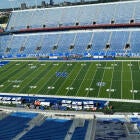Inside College Sports is a weekly notebook looking at issues occurring off the field in college sports -- big business, court cases, NCAA governance, health and safety, etc. Have a tip, idea or question about a certain topic? Email me at jon.solomon@cbsinteractive.com.
When or if will Congress help negotiate the future of college sports and what could that bargain look like? Many people who closely follow the issues of NCAA amateurism and players rights have long felt the end game will be assistance from Congress (with plenty of help from the federal courts in antitrust cases), not from the National Labor Relations Board. That feeling was reinforced again this week when the NLRB punted on answering the substantive question of whether Northwestern football players are employees by accepting compensation (an athletic scholarship) in exchange for playing.
The players' rights movement has stalled, but it’s not over by any means. Along with the NLRB’s decision to dismiss Northwestern football players’ petition to unionize, the NCAA got a victory by getting a stay in the Ed O’Bannon injunction. That prevents offers of trust fund money from being made before the Ninth Circuit Court of Appeals rules. Buying time has helped the NCAA and its members create breathing room to implement some changes -- multiyear scholarships, cost of attendance, unlimited meals, concussion safety and post-college health insurance (for the Pac-12) -- while still warning of doomsday scenarios if players can be paid.
The pending O’Bannon appeal decision is huge not only for that case, which would allow schools to pay about $5,000 per year in deferred money to players, but also Jeffrey Kessler’s lawsuit that essentially seeks free agency. It’s very possible the O’Bannon-NCAA loser in the Ninth Circuit will petition the Supreme Court. There’s also a pending lawsuit over the North Carolina scandal that relates to the NCAA’s role in educating athletes. To think change isn’t coming to college sports is to believe the NCAA will sweep every legal challenge and any future ones that arise.
“I believe some day, if it’s not resolved in one of the court cases or congressional order, players are not going to play the Final Four, they’re not going to play one of those football games,” said Sonny Vaccaro, the former shoe marketing executive and architect of the O’Bannon case. “And I want the world to tell the players they’re wrong. The players control the whole outcome.”
The players won't control the outcome as unions -- a concept that was difficult for too many people to stomach, no matter how much money the industry generates. However, several labor law experts I spoke with were surprised the NLRB decided not to exert jurisdiction, especially with three Democrats on the five-member board. The NLRB has previously been willing to rule on whether graduate assistants at private universities are employees. “It runs counter to the recent history of the NLRB really expanding the scope of its jurisdiction into a whole host of areas,” said Don Schroeder, a partner at Mintz Levin who represents management on labor employment matters.
“Wouldn’t you punt?” said Nellie Drew, a sports law professor at the University at Buffalo. “The ramifications are tremendous. … I still think depending on the institution or the sport, you could make a really good argument that certain programs are employment relationships.”
Notwithstanding what College Athletes Players Association founder Ramogi Huma says, the union efforts are done for the foreseeable future. The NLRB says “the door’s open, but they’re holding onto the handle pretty tightly,” Schroeder said. “I’d be surprised to see any different development in this area over the next five to 10 years at the earliest. It’s hard to read the decision as anything other than, ‘We didn’t want to jump into the fray.’”
The loss doesn’t lessen the value of the efforts by Huma and former Northwestern quarterback Kain Colter. The threat of unionization -- remember, one NLRB regional director declared Northwestern players are employees -- significantly helped move the needle to protect players. Huma’s worry is that without federal or state laws, any advances made by the NCAA or conferences can always be rolled back. For instance, the NCAA started four-year scholarships in 1957, and by 1973, they were banned for the next 39 years in favor of one-year renewable deals.
The enormity of the consequences attached to unions seemed to overwhelm the NLRB, which noted that it addressed Northwestern “in the absence of explicit congressional direction regarding whether the Board should exercise jurisdiction.” U.S. District Judge Claudia Wilken also noted in her narrowly-defined O’Bannon ruling that Congress could step in and help. The O’Bannon appeal and Kessler are the next steps. But Congress -- which probably has a lower approval rating than the NCAA -- may eventually play a role brokering what rights college athletes do or don’t have.
“It depends on the outcome of some of these lawsuits,” said Gabe Feldman, director of the Tulane sports law program. “If there’s a revolution, perhaps Congress gets involved. We haven’t seen Congress get significantly involved in terms of actually legislating for quite a while. In some ways the ultimate question is whether college sports, much like professional sports, are so unique that the law either needs to apply differently to them or should not apply at all.”
 |
Has NCAA abandoned 'student-athlete' term?
|
|
Did the NCAA quietly change its signature term “student-athlete” to “college athlete?” Allie Grasgreen, a higher education reporter at Politico Pro, astutely raised that question on Twitter after the NCAA’s statement this week on the Northwestern union decision. NCAA chief legal officer Donald Remy made six references to “college athletes” in his Aug. 17 statement after calling them “student-athletes” seven times in a 2014 statement when the union attempt began. In a separate NCAA news release on Aug. 6 about time demands, the NCAA referred to players as “college athletes.” For decades, the NCAA has used “student-athlete” as a noble idea for amateur athletics and a legal defense. The NCAA created the term “student-athlete” in the 1950s as a successful legal defense after the widow of college football player Ray Dennison, who died from a head injury while playing football, filed for workers-compensation death benefits. The “student-athlete” defense has worked for the NCAA in other cases. The NCAA, which declined to comment about the switch, parses words so carefully that chances are this change has some meaning behind it. In recent years, the association has shifted from “amateurism” to “collegiate model.” Historian Taylor Branch once wrote of the “deliberately ambiguous” term student-athlete this way: “College players were not students at play (which might understate their athletic obligations), nor were they just athletes in college (which might imply they were professionals). That they were high-performance athletes meant they could be forgiven for not meeting the academic standards of their peers; that they were students meant they did not have to be compensated, ever, for anything more than the cost of their studies. Student-athlete became the NCAA’s signature term, repeated constantly in and out of courtrooms.” |
|
 |
Study: NCAA inconsistent enforcing academic fraud |
|
Good luck guessing what North Carolina’s NCAA penalties may be for its academic fraud scandal. A new study analyzing 39 NCAA cases of academic fraud since 1990 concluded “the NCAA may use situational ethics given the lack of consistency between and among academic fraud cases and allegations in other cases.” Research by Oklahoma’s Gerald Gurney and Eric Snyder and Ohio University’s David Ridpath also concluded the NCAA is choosing when to get involved in academic fraud cases “by using a convenient and albeit widely accepted reason of institutional autonomy trumping NCAA rules for its own situational benefit.” The study questions why the NCAA deferred investigating athletic academic scandals at Auburn (2006), Michigan (2008) and North Carolina (2012) with allegations of fraudulent classes and high grades given to athletes. “In each case, there seemed to be collusion with athletic department personnel and a strong probability that fraudulent grades may have affected the eligibility of large numbers of athletes,” the study says. “In spite of these serious allegations, the NCAA enforcement staff declined to investigate and deferred the matter to the institutions.” In June, the NCAA sent a notice of allegations to North Carolina that didn’t charge academic fraud, but rather impermissible benefits. This was an analysis tool adopted in recent years because schools want to judge first if academic fraud occurred at their university. Enough NCAA members don’t want to walk away from policing academic fraud completely, though. There have been discussions to get rid of the extra-benefit analysis in academic cases and apply a violation called academic assistance. |
|
 |
Judge formally approves NCAA video game settlement |
|
US District Judge Claudia Wilken officially gave final written approval this week of $60 million settlements of college athlete video game cases involving the NCAA and Electronic Arts Sports. Wilken awarded attorneys’ fees for $12 million, plus reimbursements of costs totaling $2.1 million. More than 29,000 unduplicated claims were filed for settlement money and checks could start being sent in the next several months. Wilken overruled objections to the settlement made by former Connecticut basketball star Tate George and former Western Michigan wide receiver Darrin Duncan. Six people opted out of the settlement: Michael Taylor of Anniston, Ala.; Michael Bolling of Miami; Chaz Anderson of Inglewood, Calif.; David Jeremy Schatz of Birmingham, Ala.; Anthony Khalife of Plains, Pa.; and Kristoff Williams of Antioch, Calif. |
|
 |
Read 'em |
|
Each week this space will highlight some excellent recent work by college sports media on difficult topics to report. * Deadspin's Diana Moskovitz reported on the Baylor sexual assault trial you may not have heard about until Thursday night. * David Fleming of ESPN the Magazine asked whether the Oklahoma drill is a rite of passage or everything to fear about football. * In case you missed it, here’s the CBS Sports cost of attendance database and a summary of the findings of every Football Subdivision school. |
|
 |
Quote of the week
|
|
“You don't even know what the (expletive) you're talking about! Do your (expletive) job!" -- Idaho football coach Paul Petrino to a reporter about something he wrote as Petrino had to be physically restrained by an assistant, according to the reporter. Petrino denied he was restrained. Still, that’s probably not the best reaction by a coach who’s 2-21 in two years. |
|
Follow and read more from Jon Solomon on Facebook and Twitter.

![[object Object] Logo](https://sportshub.cbsistatic.com/i/2020/04/22/e9ceb731-8b3f-4c60-98fe-090ab66a2997/screen-shot-2020-04-22-at-11-04-56-am.png)







